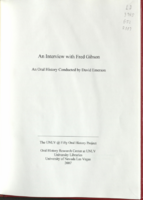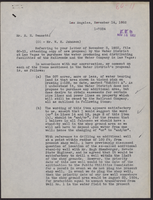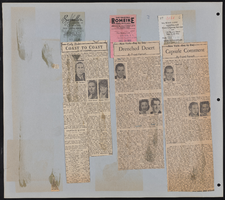Search the Special Collections and Archives Portal
Search Results
Sky Devils, 1930 to 1933
Level of Description
Scope and Contents
The Sky Devils sub-series (1930-1933) is comprised of materials pertaining to the production process of The Caddo Company's February 6, 1932 release of Sky Devils. The sub-series includes advertising and publicity, administrative, legal, production, direction, and story development records.
The advertising and publicity records include a list of scenes for inclusion in a trailer, production credits, newspaper clippings detailing the film's reception, and photographic prints. Administrative records contain correspondence pertaining to French distribution rights and Joseph Moncure March’s start date on the screenplay. Legal records contain domestic and foreign release contracts. Production and direction records include stage and sound logs and daily production reports. Story development records include screenplays, dialogue and cutting continuities, preliminary and production scripts, and continuities for adaptation. Also included are black-and-white photographic prints and a negative depicting the film during its production, as well as set, director, and advertising images.
Archival Collection
Collection Name: Howard Hughes Film Production Records
Box/Folder: N/A
Archival Component
Film title registration reports from the MPAA, approximately 1935 January to 1960 December
Level of Description
Archival Collection
Collection Name: Howard Hughes Film Production Records
Box/Folder: Box 168 (Restrictions apply), Box 169 (Restrictions apply), Box 170 (Restrictions apply), Box 171 (Restrictions apply), Box 172 (Restrictions apply), Box 173 (Restrictions apply), Box 174 (Restrictions apply), Box 175 (Restrictions apply), Box 176 (Restrictions apply), Box 177 (Restrictions apply), Box 178 (Restrictions apply), Box 179 (Restrictions apply), Box 180 (Restrictions apply), Box 181 (Restrictions apply), Box 182 (Restrictions apply), Box 183 (Restrictions apply)
Archival Component

Transcript of interview with Morris "Moe" Dalitz by Brenda Baxter, November 4, 1977-March 30, 1978
Date
Description
Interview with Morris "Moe" Dalitz by Brenda Baxter, on several dates in late 1977 to early 1978. In this interview, Dalitz talks about his business and career endeavors before coming to Las Vegas, which included a laundry service and military service. Dalitz partnered with Wilbur Clark and became a successful hotel and casino owner in Las Vegas, as well as a real estate developer with properties including the Boulevard Mall and Sunrise Hospital.
Moe Dalitz was born in Boston in 1899, and soon after his family moved to Detroit, Michigan and where his father started a linen supply company. In 1930, during Prohibition, Moe moved to Cleveland, Ohio and he became involved with the then-illegal liquor business. At the age of 41, Dalitz enlisted in the Army and was stationed at Governors Island. Moe was put in charge of laundries and dry cleaning because of his experience in the laundry business. He played an important role in creating mobile laundry units that were used in the front lines in North Africa. His ingenuity won him a non-combatant award for his "unusual interest, ingenuity and talents" applied during his service. At the end of war, Moe returned to Cleveland, where his partners were successfully carrying on their business. It was then that they decided to go into the casino-nightclub business, opening nightclubs in Ohio and Kentucky. A couple years later, Moe and his partners met Wilbur Clark and agreed to finance his inactive project in Las Vegas. Thus, in 1950, the Desert Inn Hotel and Casino opened, and Moe Dalitz ushered in a new era for the city. Moe and partners continued to elevate the sophistication of the Strip when they acquired the operating lease to, and later part ownership of, the Stardust Hotel and Casino. Moe was instrumental in bringing the French Lido de Paris show to the Stardust, which was considered the most spectacular nightclub show produced in Las Vegas at its time. In addition to his gaming industry ventures, Moe engaged in significant real estate development, along with partners Allard Roen, Merv Adelson and Irwin Molasky. Their projects included Sunrise Hospital, The Boulevard Mall and Las Vegas Country Club as well as La Costa Resort and Spa in California. At the time of the interview, Moe was involved with the construction of a downtown hotel and casino. Moe Dalitz was the recipient of the Humanitarian Award from the American Cancer Research Center, and supported the Variety Club and the Home of the Good Shepard, amongst other charities.
Text

Transcript of interview with Fred Gibson by David Emerson, February 13, 2008
Date
Archival Collection
Description
Text

Letter from R. L. Adamson (Los Angeles) to E. E. Bennett, November 14, 1952
Date
Archival Collection
Description
Discussion of needed revisions for the contract for the Las Vegas Valley Water District's purchase of water production facilities and land from the Union Pacific Railroad.
Text

